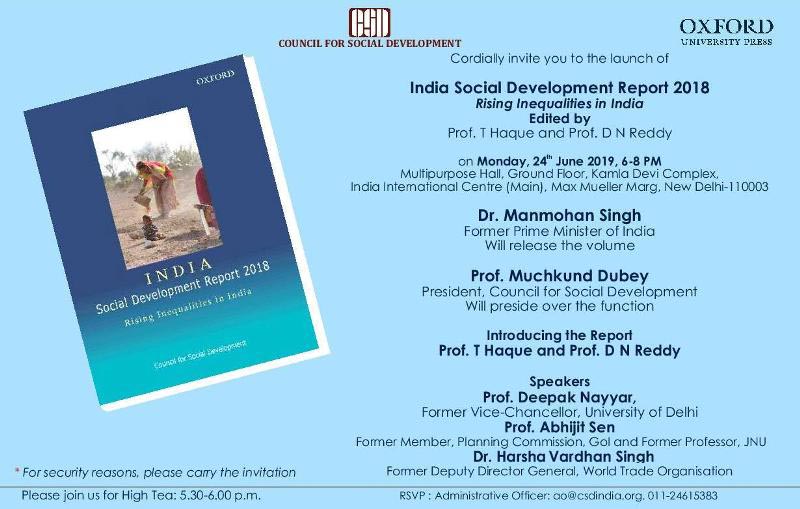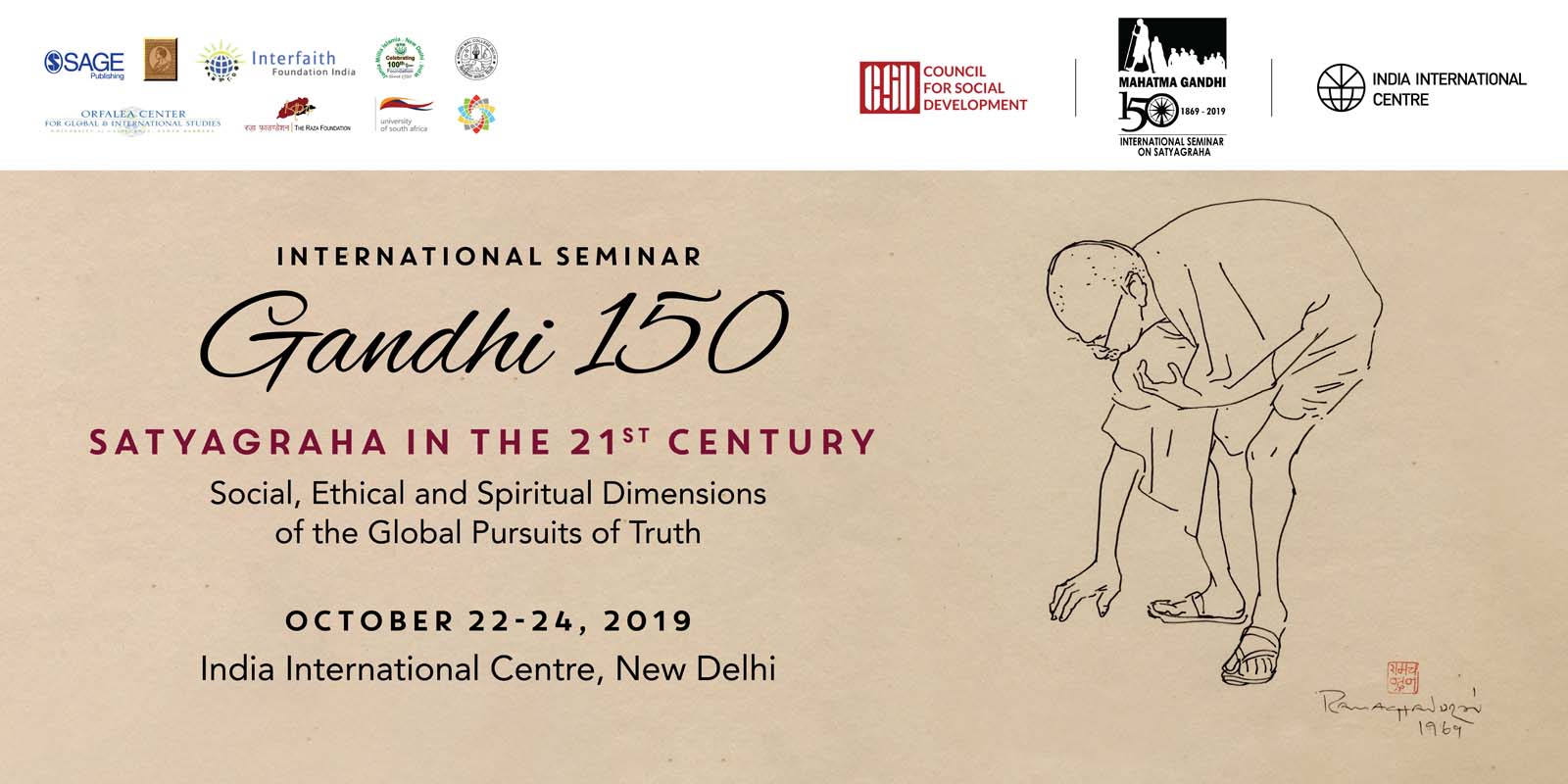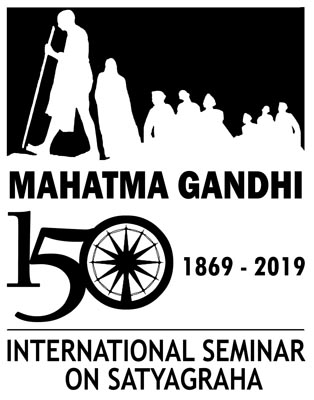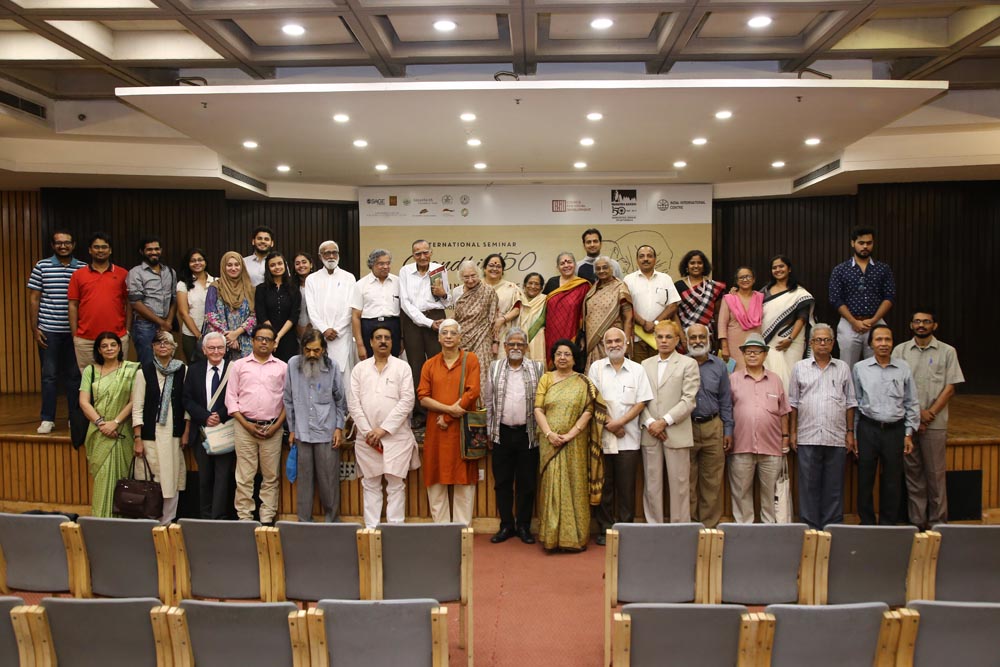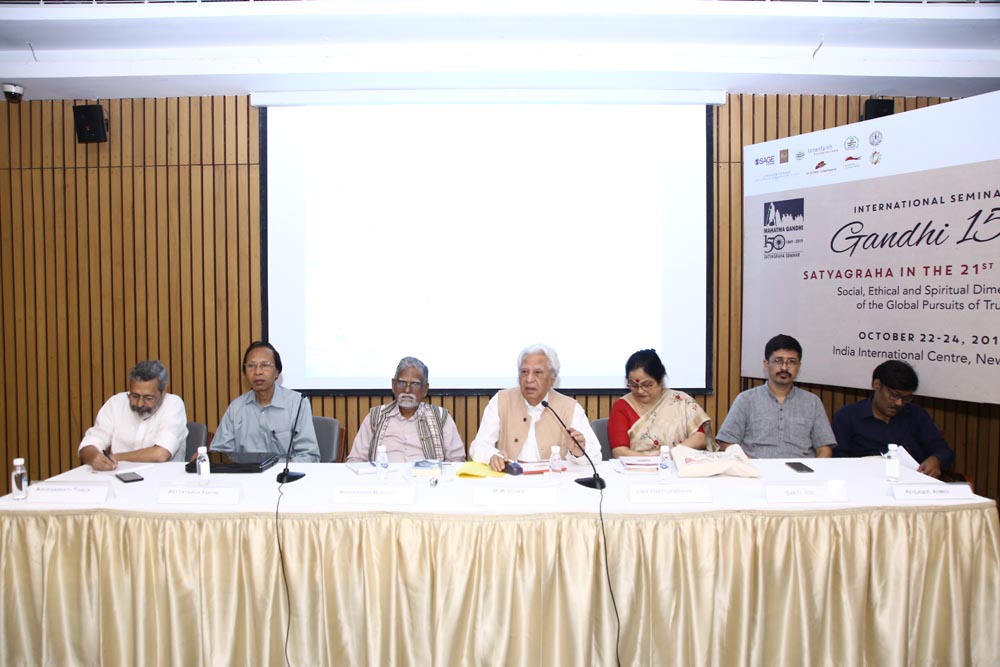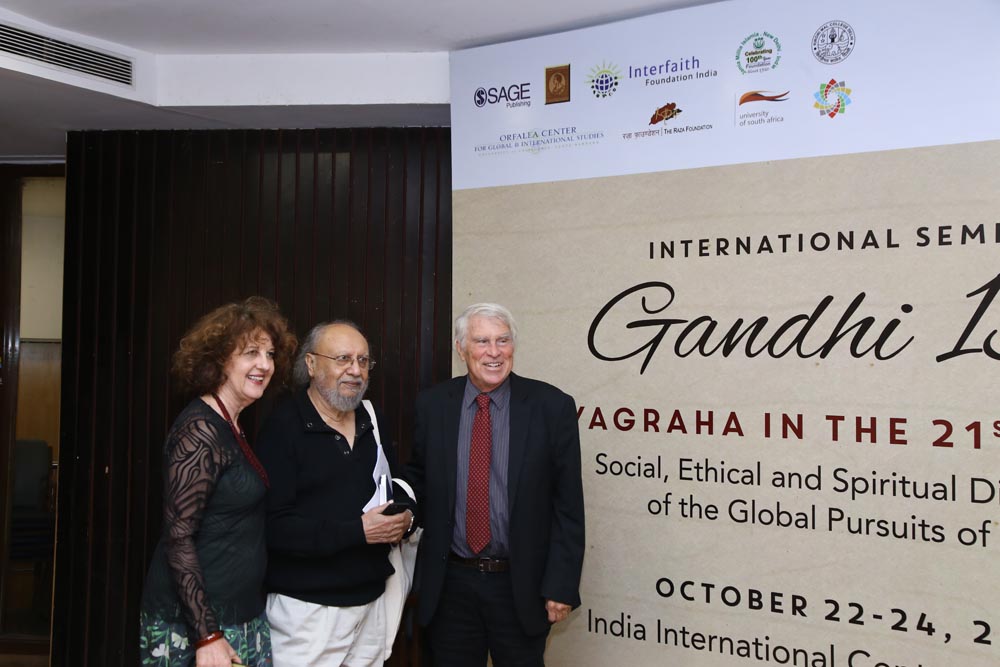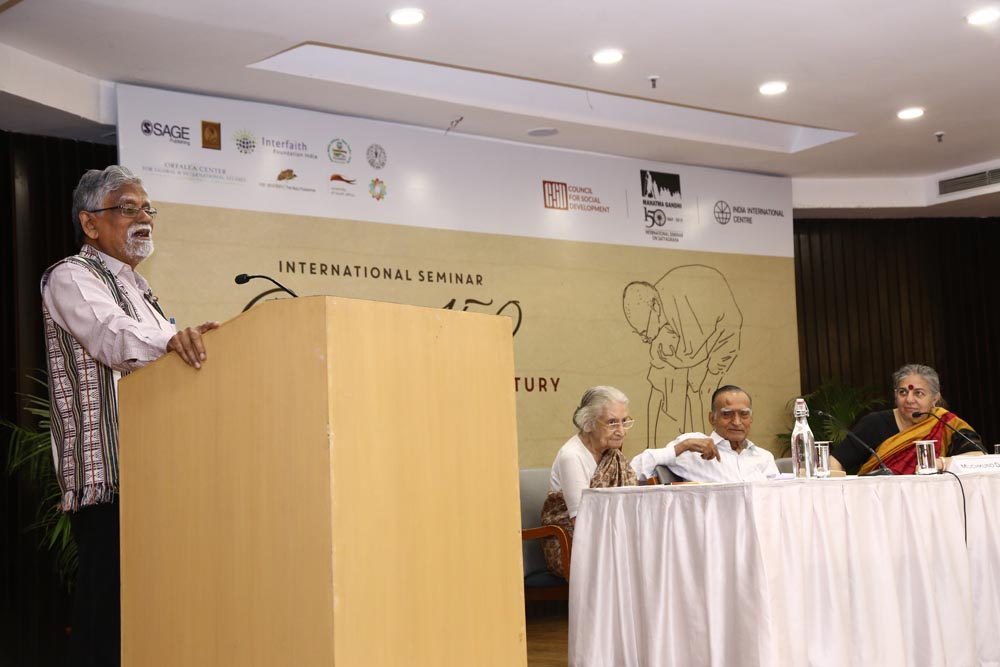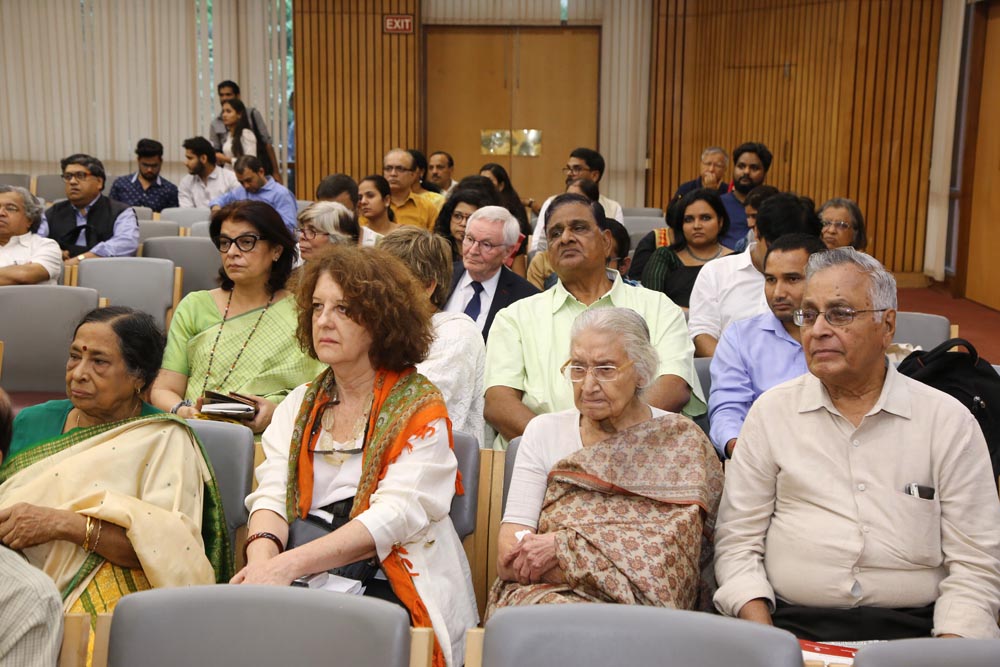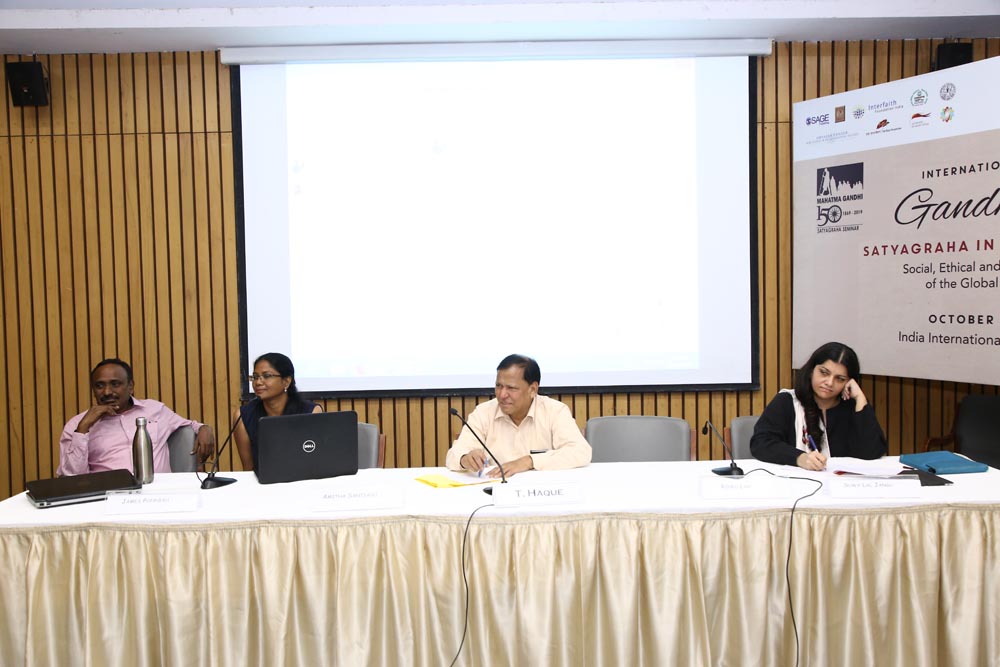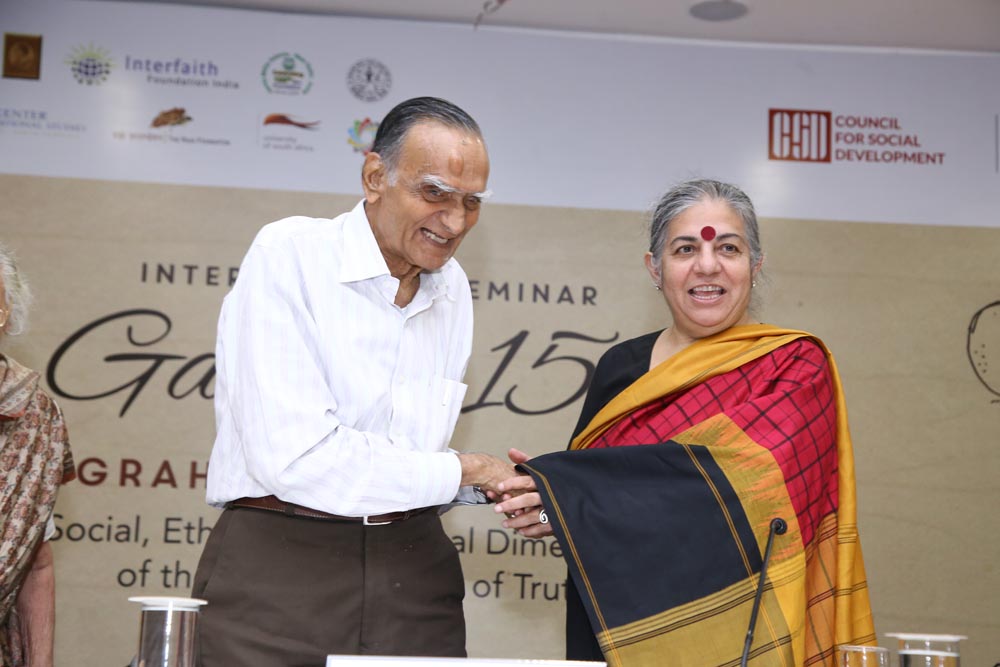The Council held a discussion on macroeconomic aspects and implications of the Union Budget 2019-20, on the 13
th August, 2019. Prof Deepak Nayyar, Prof Aul Sarma, and Prof Biswajit Dhar deliberated on the provisions of the union budget and Prof Muchkund Dubey chaired the session.
The union budget 2019-20 presented by the finance minister in the parliament turns out to be a political statement of the government to showcase the achievements of last five years and outline the good intentions for the next five years. In doing so, it reaches out to a wide range of constituencies; women, farmers, SCs, STs etc. with political messaging, for the poor. The budget statement is basically populist in nature and the real problems confronting the Indian economy have received neither recognition nor attention.
The GDP growth in the last quarter of 2018-19 was the lowest in the past 20 quarters and the growth continues to slow down surely and steadily. The investment rate in the economy during the period between 2014-15 and 2018-19, dropped to around 28-29 per cent of GDP, from 33 per cent during the period between 2011-12 and 2013-14. This rate was around 35 per cent in the preceding years. The investment rate declined because saving rate in the economy was declining. There is a massive slowdown in every sector, particularly in automobiles and Fast Moving Consumer Goods sectors. The huge job losses in the automobile sector, which accounts for 49 per cent of the Gross Value Added (GVA) in the manufacturing sector, are worrisome. The national accounts statistics show a decline in private final consumption expenditure as a proportion of GDP. The country’s exports stagnated at about $300 billion in current prices and have thus declined in real terms. Although the world trade is not booming, it continues to grow in real terms. This means that India’s share in world trade is falling. The unemployment rate doubled between 2011-12 and 2017-18. In 2011-12, it was 3 per cent, now it has reached 6.1 per cent. Budget has done little, if anything, to revive investment, domestic consumption, economic growth and exports. Consumption is important driver of growth from demand side while both exports and investments are drivers of growth not only from demand side but also from the supply side. They are also a source of employment creation. So a slowdown in exports, growth and investment leads to a slowdown in employment creation too.
The government adopted supposedly a virtuous path of macroeconomic stability since 2014 when fiscal deficit, as a percentage of GDP was reduced to the range of 3 per cent. The prices of crude oil also remained low in the global market through much of the period since 2014. The government could have used the decline in oil prices for the expansion of public investment. However, the policy of keeping fiscal deficit under control did not lead to much improvement in the economy. As a matter of fact, things became much worse than before.
It would have been logical for the government elected with such a massive mandate, to have used the budget to try to revive growth from the demand side, by stimulating consumption by increasing expenditure on public investment. However, this did not happen. The total government expenditure as a proportion of GDP has remained almost the same between 2018-19 and 2019-20, at 13 per cent. Thus, there was no attempt to revive growth through public investment. Capital expenditure which is a proxy for investment has declined to 12 per cent from 13 per cent last year. The basic underlying objective of this approach seems to keep fiscal deficit in control which is pegged at 3.3 per cent of GDP in the current budget. There is nothing sacrosanct in keeping the fiscal deficit pegged at around 3 per cent of the GDP. Nothing in macroeconomics stipulates the optimum level to which the fiscal deficit, as a proportion of GDP must be reduced. Government borrowing is always sustainable if it is used to finance investment, the rate of return on which is higher than the rate of interest payable. The obsession of the government that borrowing from public sector enterprises is irrelevant, is baffling and beyond reason.
In the past five years, all sorts of deficits; fiscal deficit, revenue deficit, primary deficit etc. have remained within the most respectable range in terms of orthodox economics. Yet, the outcome is pathetic in terms of growth, investment, and exports in the last five years. In spite of this, the government has stayed with the same obsession in its entire budget exercise that the difference between its income and expenditure should not be more than 3 per cent of the GDP. This obsessive concern about curbing fiscal deficit might lead to a further slowdown of growth which will have consequences for employment creation as well as the well-being of the people. Moreover, achieving growth should not be the sole objective. Economic growth, in coordination with macroeconomic policies, should lead to equality.
The budget has also underestimated expenditure and overestimated revenues, a habit into which successive governments have lapsed ever since life began. The outlays provided for the sectors or programmes, wheather infrastructure or welfare, simply do not match the ambitious outcomes envisaged in the budget. The actual allocations for infrastructure and welfare programmes are worrisome and deficient. Capital expenditure for infrastructure development has declined in the current budget by Rs. 50 billion from the revised budget of 2018-19. Much of the infrastructural financing, which is essential and desirable, will be from off-budget or extra-budgetary resources. So the government has to mobilize resources by borrowing from the people or financial sector. In the process, the government is underestimating the resources that it can mobilise by its own means. There is also an overestimation of revenues. The Finance Minister presented her budget in July 2019 and by that time, the Comptroller General of Accounts (CGA) made available the actuals of both revenue and expenditure. In the revised estimates, the Finance Minister used figures which were belied by reality. The figures provided by CGA shows that there was a massive shortfall in the collection of taxes, upto Rs. 1.6 trillion which is close to 0.8 per cent of the GDP. Consequently, the estimates of the tax revenue projected in the Union budget of 2019-20 will be realised when the actuals turn out to be 20 per cent higher than the actuals in 2018-19. But the actual in 2018-19 were only 8 per cent higher than that in 2017-18. In the revenues from the GST too, there was a shortfall of Rs. 1 trillion in 2018-19. So tax revenues have been overestimated hugely. The non-tax revenue, the other component of the government income, is estimated to rise from Rs. 1.24 trillion to Rs. 3.1 trillion of which dividends are expected to rise from Rs. 1.1-1.2 trillion to Rs. 1.65 trillion, by a whopping 38-40 per cent. Now this is a tall order. Clearly, the government is expecting that the RBI will pay them a huge portion of its dividend. This is a worrying fact because RBI resources should not become a soft option access. The RBI or the equivalent central bank in most of the countries pays government a part of its dividends, but in terms of an agreed framework so that it can maintain reserves at a safe level. The other source of non-tax revenue is the sale of government shares in public sector enterprises described as strategic disinvestment and which is expected to fetch more than Rs. 1 trillion. This is portrayed as reform. But in effect, it is like financing the fiscal deficit. Out of non- debt capital receipts, 88 per cent are disinvestment receipts. Now it is clearly not fiscal adjustment because it is using asset sales to provide one time revenue receipts rather than revenue receipts which recur year after year. The receipts from disinvestment should be used for only two purposes. First, to retire public debt so that the interest burden diminishes; and second, to restructure public sector enterprises which have huge debt-equity ratios (for instance banks need to recapitalize and so on). At this juncture, stepping up public investment and government expenditure could have kick started growth through multiplier effect by providing stimulus to private investment and private consumption. Allowing the fiscal deficit to rise by 0.5 per cent of GDP would have provided the government with more than one trillion rupees, while allowing it to rise by 1 per cent would have allowed the government to have an income of two trillion rupees. This first budget of the newly elected government is hugely distortionary in terms of simple macroeconomics. There is a need to step up public investment even at the cost of a rise in fiscal deficit because it will check the slowing down of consumption demand which is slowing down the economy, and will lead to a growth in national income which will in turn lead to a growth in tax revenues.
The government’s plan to make India a $ 5 trillion economy by 2024 is just a catchy slogan. There is no miracle needed to reach that level. This is a logical arithmetical consequence of the current rate of growth, and the government is not entitled to take credit for it. In 2018-19, the GDP at current prices was already $ 2.7 trillion which to a great extent was the outcome of the economic growth registered in the past fourty years. India started growing at a much higher rate since around 1979-80. During these last four decades, the Indian economy grew at an average rate of 6 per cent which was second only to China during this period. Assuming that the annual growth rate of GDP in nominal terms stays around 12 per cent, then the economy will grow at 7 per cent per annum in real terms, if inflation rate stays around five percent and the rupee does not depreciate. This will automatically result in the size of the economy growing from $ 2.7 trillion now to $ 5 trillion in just over five years.
Growth is necessary, but its distributional aspects must be taken into account. If the rate of employment creation is low then unequal distribution of wealth leads to rising inequality. For instance, if poorest 50 per cent people have 10 per cent of share in the national income, then they will get only 10 per cent of the increase in the national income. On the other hand, if the richest 10 per cent have a share of 50 per cent, they will have 50 per cent of the incremental income. We need to recognize that growth has distributional as well as employment implications.
This government in this budget has increased the vulnerability of external sector of the economy in the international financial market by allowing the denomination of government bonds in foreign currency. It is a terrible idea as it creates long-term liabilities and it raises the resource cost of servicing such debts if the exchange rate depreciates.
In the past years, a large part of the foreign direct investment in the Indian economy took place in the form of short- term private equity. Many of the takeovers in recent years (including flipkart) are because of the preponderance of private equity. A large proportion of investment has also come in the IT and IT enabled services sector. Majority of companies in these sectors have invested in the country for setting up and managing websites. The remaining investment is in retail and whole sale trade and e-commerce. A large part of the profits from these investments and the capital outlay itself, is repatriated to the countries from where they come. This reverse transfer substantially reduces the net foreign private capital inflow. Besides, such investments cannot revive the economy, as the world over, we have not have a single evidence of private investment reviving growth, particularly when investment sentiments are down. It is always the public investment which comes and rescues the economy. Foreign investment has never contributed any major share of the investment in the Indian economy. In any case, there is very slender likelihood of a dramatic spurt in it in the currently prevailing world economic scenario.
There have been no serious efforts to mobilize resources from the domestic economy (which are not considered debts). In fact, for the last 30 years or so, no government has attempted to mobilize domestic resources. They have relied on foreign funds to step up investment in the economy.
Total financial transfer to states in 2019-20 is Rs. 1.6 trillion. The central government collected Rs. 4.5 trillion from different surcharges in 2018-19. This amount is not included in the divisible pool of resources. The Fourteenth Finance Commission earmarked 42 per cent of the divisible pool to the states, but the central government, in real terms, squeezed this transfer by levying surcharges.
The Economic Survey shows tax incentives to private corporate sector out of revenue foregone. The data for this year is presented for 8,41,000 companies. Over 3,62,000 companies out of these are running into losses. No taxes are levied on them. Another similar number of companies have an annual profit of less than Rs. 10 million. So, more than 90 per cent of corporate sector is not paying any taxes either because the companies are making losses or earning very low profits. Since 2005, when these details were included in the economic survey, the number of such units has remained almost the same. Revenue foregone due to the incentives given to the corporate sector is close to Rs. 1.08 trillion and the receipts from disinvestment are almost Rs. 1.06 trillion. So on one hand, the government is foregoing the resources in the form of giving tax incentives, on the other hand, it is selling the family silvers to acquire about the same amount of resources from disinvestment. Even the customs revenue has come down from 28 per cent of the tax revenue in the early 1990s to 14 per cent in 2014-15.
In short, the Union budget neither engages with some of the current problems of the economy nor with the structural problems of the sectors crucial for the Indian economy such as agriculture, industry, education and health. The Budget proposals carry over to the current financial year, the schemes and programmes couched as attractive slogan, announced by the government in recent past. These schemes do not have well considered forward and backward linkages in the economy. Nor are they designed to solve the structural problems in the key sectors of the economy. The country has not met the target of universalisation of elementary education by 2015 as provided in the RTE Act. The Act has, in fact, been scuttled and sidetracked. The state of secondary education is almost like that of infrastructure. The government has only meager resources to invest in it and has, therefore left it to the private sector. As compared to the elementary education, the proportion of what is needed in secondary education ranges between 1:7 to 1:20, depending upon what requirement we take into account: building schools, teachers’ recruitment, training of teachers etc. As for the elementary education, the amount of additional resources needed to universalise it was estimated by a CABE committee to be Rs. 750 billion under the best scenario and Rs. 550 billion per annum for the same pursuit under the lowest scenario. Yet the amounts provided in the relevant budgets have ranged between Rs. 230 billion to 270 billion. Evidently, the gap is huge. If the required amount of resources is invested, the country will have an educated population which is a huge asset and if used judiciously, the economy will get a big stimulus in growth.
One way of tapping more revenues is through levying a wealth tax on the richer section of the society. According to the estimates provided by Prabhat Patnaik (The Indian Express, July 8 2019), a levy of 1 per cent of wealth tax on the billionaires of the country can fetch Rs. 5.6 trillion and an inheritance tax, that must accompany a wealth tax t prevent evasion, can fetch even more. Even assuming that 5 per cent of billionaires’ wealth gets passed on every year, an inheritance tax, will fetch an additional Rs. 9.3 trillion. These two taxes alone, both imposed only on billionaires, can fetch around Rs. 15 trillion, and are quite sufficient for financing for ensuring every Indian’s five basic economic rights: right to food, right to employment, right to quality education up to the secondary level, right to quality healthcare, and right to old age pension of Rs. 2000 per month.
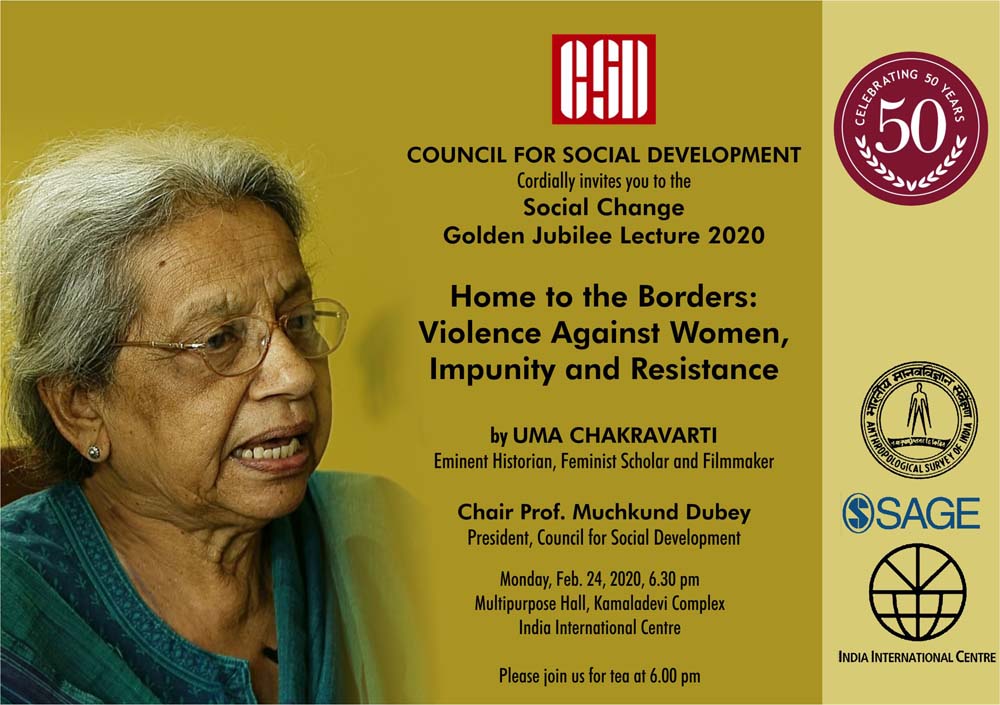

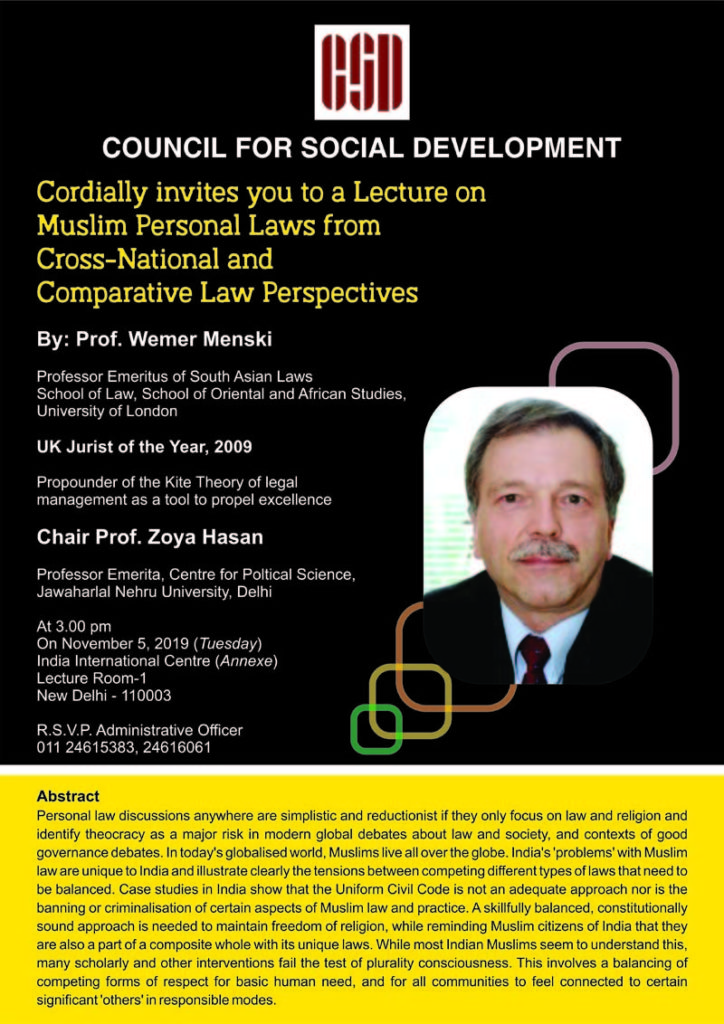
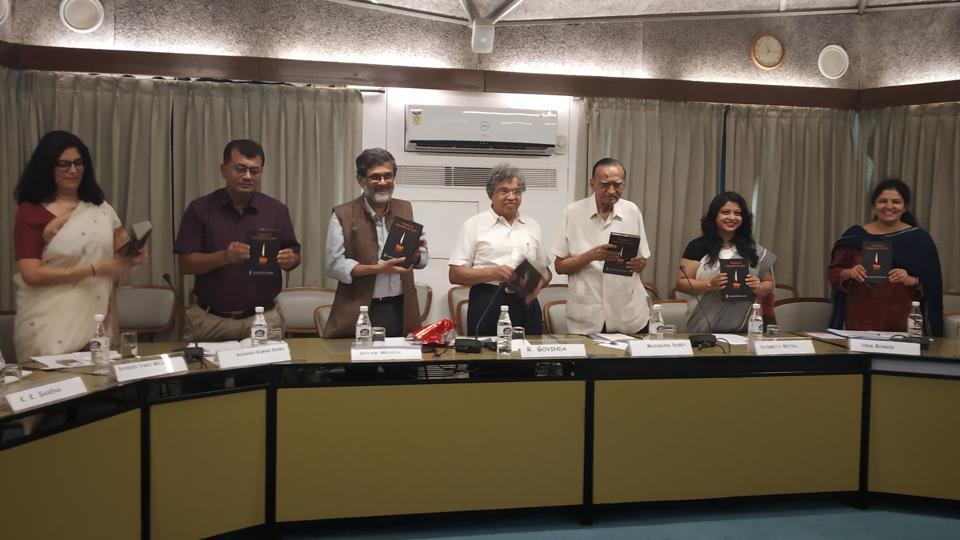 The Council launched the book Visions of Education in India edited by Prof. Muchkund Dubey and Dr. Susmita Mitra at the India International Centre (IIC) on 2nd September 2019. Prof. Shyam Menon, University of Delhi and former Vice Chancellor of Ambedkar University, Delhi was the Chief Guest of the event. Other panelists were Prof. Avinash Kumar Singh, Head, Department of Education Policy, National University of Educational Planning and Administration (NUEPA), Ms. ShireenVakil Miller, Head of Policy & Advocacy at Tata Trusts, and Dr. Hem Borker, Assistant Professor, Centre for Study of Social Exclusion and Inclusive Policy, Jamia Millia Islamia. The panel discussion was chaired by Professor R Govinda, Distinguished Professor of CSD and former Vice Chancellor of NUEPA.
The Council launched the book Visions of Education in India edited by Prof. Muchkund Dubey and Dr. Susmita Mitra at the India International Centre (IIC) on 2nd September 2019. Prof. Shyam Menon, University of Delhi and former Vice Chancellor of Ambedkar University, Delhi was the Chief Guest of the event. Other panelists were Prof. Avinash Kumar Singh, Head, Department of Education Policy, National University of Educational Planning and Administration (NUEPA), Ms. ShireenVakil Miller, Head of Policy & Advocacy at Tata Trusts, and Dr. Hem Borker, Assistant Professor, Centre for Study of Social Exclusion and Inclusive Policy, Jamia Millia Islamia. The panel discussion was chaired by Professor R Govinda, Distinguished Professor of CSD and former Vice Chancellor of NUEPA.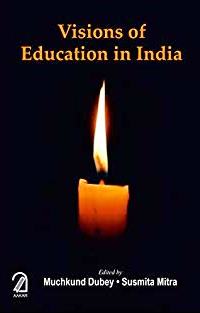 Published by Aakar Books, Visions of Education in India seeks to review education in the country through a matrix of nation-building, democratization process, identity, power, social and economic divisions, and social hierarchies – all in the overall framework of globalization and neo-liberalism. The book has contributions from 15 domain experts, leading academics and activists (including the editors themselves), Medha Patkar, J.B.G. Tilak, Prabhat Patnaik, G. Hargopal among others. The book traces the journey of visions of education since the ancient times, and emphasizes that in the complex pluralistic society like that of India, it is nearly impossible to choose a single vision of education that satisfies all our needs and aspirations. What is important is to be able to reconcile the differences among the visions to the extent possible and bring the best elements of these visions within a unified policy framework.
Published by Aakar Books, Visions of Education in India seeks to review education in the country through a matrix of nation-building, democratization process, identity, power, social and economic divisions, and social hierarchies – all in the overall framework of globalization and neo-liberalism. The book has contributions from 15 domain experts, leading academics and activists (including the editors themselves), Medha Patkar, J.B.G. Tilak, Prabhat Patnaik, G. Hargopal among others. The book traces the journey of visions of education since the ancient times, and emphasizes that in the complex pluralistic society like that of India, it is nearly impossible to choose a single vision of education that satisfies all our needs and aspirations. What is important is to be able to reconcile the differences among the visions to the extent possible and bring the best elements of these visions within a unified policy framework.